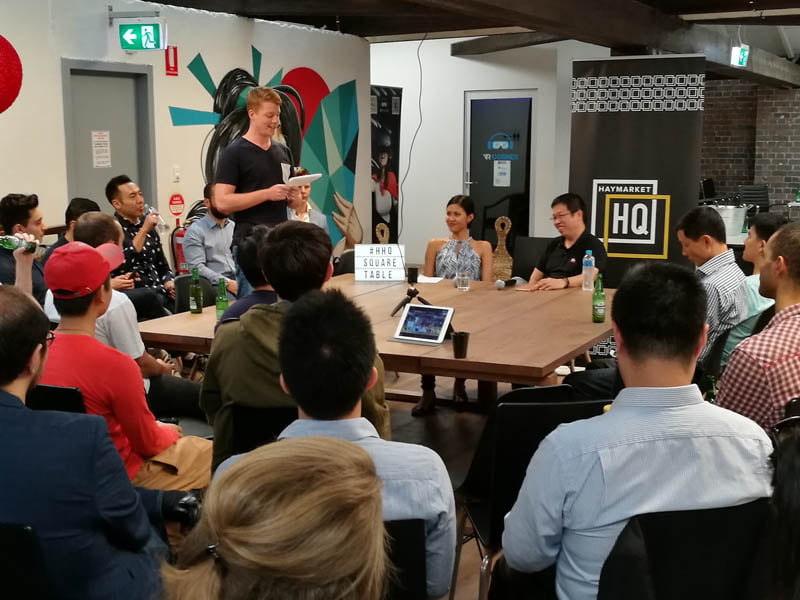Ecommerce giant Alibaba is on the lookout for Australian and New Zealand startup talent and will host its first pitching competition in Sydney in September to find a pair of companies to plug into Chinese investors.
The big Chinese e-commerce group has been dialling up its presence in Australia over the last 12 months, opening a data centre in Sydney to underpin its Alibaba Cloud business, and switching on a local HQ in Melbourne last February.
Alibaba founder Jack Ma had a chinwag with Prime Minister Malcolm Turnbull when Mr Turnbull toured the company’s Hangzhou campus last year.

The company is seen by local exporters as a direct injection platform into the vast Chinese market and there are more than 1,300 Australian and 400 New Zealand brands on the company’s Tmall and Tmall Global online shopping sites.
Meanwhile its Alipay payments platform is used here by Chinese tourists and students and helped along through partnerships with the Commonwealth Bank and Quest Payment Systems.
And now the Alibaba Cloud unit is having a crack at playing Sino shark tank for local startups that aspire to making a mark in the Chinese market.
Called the Create@Alibaba Cloud pitch contest, the pitch event will be held with Sydney’s Haymarket HQ hub which specialises in helping companies break into Asian markets.
“The competition is interesting for companies that want to go into China. Alibaba knows how to setup there to get that optimum speed in China, which can be a nightmare for companies new to the Chinese market,” says Haymarket HQ general manager Duco van Breeman.
So far most Chinese-market centric pitch competitions that have been run here have tended to be put on by Chinese provincial governments.
“Why this is different to every Chinese pitching competition that has been out here before is very simple,” says Mr van Breemen.
“[Alibaba is] the Google of China, it is the number one tech company in China organising it and they have the best network and resources in the country.
“Anything with their stamp on it is worth a lot in China, and they have got the top VCs in China to judge and check out the winners.”
The competition is currently sourcing entries which will be vetted by a judging panel and 12 applicants will be selected to take part in the local pitching competition on September 22. Applications for the contest close on August 31.
“We are pleased to work with Haymarket HQ and expand the Create@Alibaba Cloud program to the ANZ region this year,” the company’s ASEAN and ANZ chief Raymond Ma said.
“Alibaba Cloud celebrates the innovations of startups in these markets and is committed to providing technologies that stimulate growth,” he said.
Competing company’s must be no older than five years, be registered in Australia or New Zealand, have less than $AUD500,000 in revenue and not be publicly listed.
They need to have developed products, applications or services in the areas of artificial intelligence, big data, cyber security, digital services, augmented reality, virtual reality, or internet of things.
From the twelve, two divisional winners will be chosen to fly to Shanghai to compete in the global Create @ Alibaba Cloud Startup Contest which has divisional winners from the China and other regions around the world.
The ANZ division champion will also score 50,000 credit with Alibaba Cloud, training prior to the global finals, access to Chinese investors and preferential access to the Alibaba Group’s first round of investment interviews and recommendations.
Mr van Breemen is a Dutch expat who spent eight years in China before moving to Sydney. He studied at a Chinese university and setup an incubator in Shanghai that helped SMEs enter the Chinese market.
He moved to Australia in 2016, needing a change and having struggled with the air pollution in Shanghai.
While in China he saw rapid change as the country morphed from being the ‘factory of the world’ to a huge consumer market and from an almost pure cash society to one that one that is heavily digitised.
“The middle class there will hit 850 million by 2030, with the resources we have in Australia in makes perfect sense that we focus more on the Asia region,” he says.
Like other local China hands, he believes the Australian startup scene is too centred on the US as the market to attain scale.
“In Holland we have a saying: what the farmer doesn’t know he won’t eat.
“That’s very much the case with China. We don’t know it, it’s a mystery and its got a pretty bad reputation for intellectual property protection.”
“Because of this many have ignored it, but Australia is in by far the best position to capitalise on China’s growth.
“The biggest reason is the Chinese talent pool that’s here. These are people with strong networks into China and speak the language. So few other countries have that.”
Do you know more? Contact James Riley via Email.

